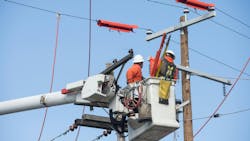SECC Survey Finds Gen Z Reports Lowest Trust Levels in Electricity Providers
Gen Z consumers are less likely to view their electricity providers as trustworthy, reliable, or satisfactory compared to older generations, according to new research from the Smart Energy Consumer Collaborative (SECC), a nonprofit organization that studies Americans’ energy-related behaviors, interests, and values.
On a 10-point scale, Gen Z respondents rated their providers 7.0 for trust and 7.2 for satisfaction, compared with 7.2 and 7.3 among Millennials and Gen X, and 7.5 for both metrics among Baby Boomers. The largest gap appeared in perceptions of reliability: Gen Z rated their providers 7.3, while Millennials and Gen X rated them 7.8, and Boomers 8.1.
The findings come from SECC’s new paper, Building Awareness and Trust with Gen Z, based on a nationwide Harris Poll survey of 2,300 Americans responsible for their household electric bills. The paper examines Gen Z’s energy priorities, engagement with electricity providers, and interest in clean energy technologies and programs.
While Gen Z’s current views suggest lower satisfaction with their providers, the report also identifies opportunities for greater engagement. The generation is more likely to see technology as a way to improve quality of life and to spend money on it when benefits are clear — 70 percent agreed with that statement, compared with 63 percent of Millennials and Gen X respondents and 38 percent of Boomers.
Gen Z participants were also more likely to own smart home devices such as smart plugs, thermostats, and lighting, which can be connected to energy-saving programs. They reported higher rates of electric vehicle ownership, greater familiarity with artificial intelligence (AI), and more optimism about AI’s potential societal benefits — 59 percent of Gen Z said they believe AI will have a positive impact, compared with 47 percent of Millennials and Gen X and 23 percent of Boomers.
The study also highlights unique barriers that may limit Gen Z’s participation in energy programs. Members of this generation are more likely to rent, live in multi-family buildings, or share housing with roommates, reducing their ability to make energy-related upgrades. Nearly half (47 percent) said they don’t know what steps to take to save energy at home, compared with 29 percent of Millennials and Gen X and 14 percent of Boomers.
“As the second-largest generation after Millennials and a growing part of the U.S. economy, Gen Z is no longer an emerging generation whose needs can be addressed in the future,” said SECC President and CEO Nathan Shannon. “They are increasingly an important part of each electricity provider’s customer base, and providers and other stakeholders need to make sure that they understand what makes these customers tick and what blocks them from participation."
